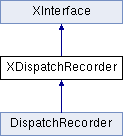provides recording functionality of dispatches More...
import"XDispatchRecorder.idl";

Public Member Functions | |
| void | startRecording ([in] com::sun::star::frame::XFrame Frame) |
| initializes the recorder by passing the frame for which all macro statements shall be recorded More... | |
| void | endRecording () |
| stops the recording process More... | |
| void | recordDispatch ([in] com::sun::star::util::URL URL, [in] sequence< com::sun::star::beans::PropertyValue > Arguments) |
| records a single dispatch call identified by its command URL More... | |
| void | recordDispatchAsComment ([in] com::sun::star::util::URL URL, [in] sequence< com::sun::star::beans::PropertyValue > Arguments) |
| records a single dispatch call identified by its command URL, but comments it out More... | |
| string | getRecordedMacro () |
| returns the recorded source code More... | |
 Public Member Functions inherited from XInterface Public Member Functions inherited from XInterface | |
| any | queryInterface ([in] type aType) |
| queries for a new interface to an existing UNO object. More... | |
| void | acquire () |
| increases the reference counter by one. More... | |
| void | release () |
| decreases the reference counter by one. More... | |
Detailed Description
provides recording functionality of dispatches
With such recorder it will be possible to record requests of type XDispatch by using additional interface XRecordableDispatch. The result of that will be a a script which can be used to start the dispatch at later time again. Such recorder objects are available on a XDispatchRecorderSupplier which is provided by the Frame service.
- See also
- Frame
- XDispatchRecorderSupplier
- Since
- OOo 1.1.2
Member Function Documentation
◆ endRecording()
| void endRecording | ( | ) |
stops the recording process
Must be called in pairs with XDispatchRecorder::startRecording().
- Attention
- The recorder uses this method to control the lifetime of its internal used macro buffer. It will be cleared here. So the macro must be fetched before endRecording() is called.
- See also
- getRecordedMacro()
◆ getRecordedMacro()
| string getRecordedMacro | ( | ) |
returns the recorded source code
This method must be used before endRecording() is called! Otherwise the macro will be released.
- Returns
- the recorded data as a string which can be interpreted as a script
◆ recordDispatch()
| void recordDispatch | ( | [in] com::sun::star::util::URL | URL, |
| [in] sequence< com::sun::star::beans::PropertyValue > | Arguments | ||
| ) |
records a single dispatch call identified by its command URL
- Parameters
-
URL the full parsed command URL Arguments optional arguments for the command URL
(see com::sun::star::document::MediaDescriptor for further information)
◆ recordDispatchAsComment()
| void recordDispatchAsComment | ( | [in] com::sun::star::util::URL | URL, |
| [in] sequence< com::sun::star::beans::PropertyValue > | Arguments | ||
| ) |
records a single dispatch call identified by its command URL, but comments it out
This way calls that failed on execution can be documented.
- Parameters
-
URL the full parsed command URL Arguments optional arguments for the command URL
(see com::sun::star::document::MediaDescriptor for further information)
◆ startRecording()
| void startRecording | ( | [in] com::sun::star::frame::XFrame | Frame | ) |
initializes the recorder by passing the frame for which all macro statements shall be recorded
- Parameters
-
Frame it includes the document on which such requests shall be recorded
The documentation for this interface was generated from the following file:
- com/sun/star/frame/XDispatchRecorder.idl